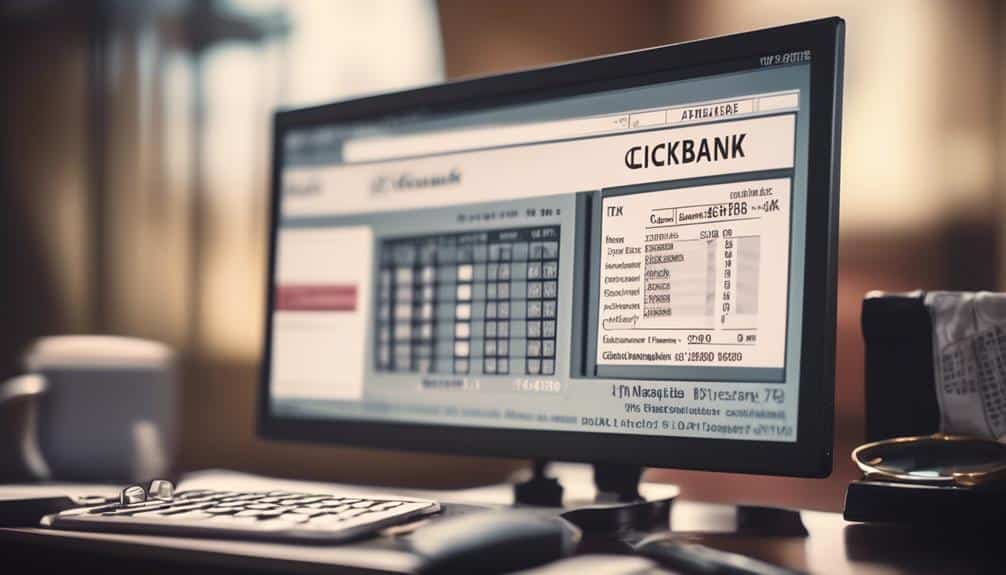ClickBank Earnings and Taxes: What You Need to Know Before Filing
If you're earning income through ClickBank, you might be wondering about the tax implications. Despite the digital nature of the platform, ClickBank earnings are indeed taxable.
Understanding how to navigate IRS reporting requirements, knowing what expenses can be deducted, and being aware of the appropriate tax forms for ClickBank affiliates are crucial aspects to consider.
However, there's more to this topic that goes beyond just filing taxes. Stay tuned to discover essential insights that can help you optimize your tax situation and maximize your earnings as a ClickBank affiliate.
Key Takeaways
- Reporting ClickBank earnings is essential for tax compliance and to avoid penalties or audits.
- Keep detailed records of deductible expenses such as marketing costs, website expenses, and professional fees related to ClickBank income.
- Understanding self-employment tax considerations and retirement planning can help lower taxable income and maximize tax advantages.
- Stay informed about tax credits available to ClickBank affiliates, claim deductions, and seek professional advice to optimize tax savings.
Taxable ClickBank Earnings

Taxable ClickBank earnings are subject to income tax regulations based on your total income and can vary depending on your tax bracket. It's essential to understand how ClickBank earnings impact your taxable income and filing requirements. When you earn income through ClickBank, it contributes to your overall taxable income. This means that you must report your ClickBank earnings when filing your taxes to ensure compliance with the law.
Your taxable income includes all sources of income, including earnings from ClickBank. Failing to report this income could result in penalties or audits from the IRS. Understanding your filing requirements is crucial to avoid any issues with the tax authorities. Depending on the amount of your ClickBank earnings, you may need to file additional forms or meet specific reporting thresholds.
Understanding IRS Reporting Requirements
When it comes to understanding IRS reporting requirements for your ClickBank earnings, it's essential to grasp the IRS reporting basics and familiarize yourself with the necessary tax forms. Ensuring compliance with the IRS regulations by accurately reporting your earnings is crucial to avoid any potential penalties or issues in the future.
Familiarizing yourself with the specific tax forms required for reporting ClickBank earnings will help streamline your tax filing process and keep your financial records in order.
IRS Reporting Basics
Understanding IRS reporting requirements is crucial for accurately reporting your ClickBank earnings and taxes. When it comes to IRS reporting, it's essential to ensure that you fulfill all necessary obligations to avoid any penalties or issues. One key aspect of IRS reporting is understanding what tax deductions you may be eligible for when reporting your ClickBank earnings. By leveraging tax deductions effectively, you can lower your taxable income and potentially reduce the amount of tax you owe. Below is a table summarizing common tax deductions related to ClickBank earnings that you should be aware of:
| Tax Deduction | Description | Eligibility Requirements |
|---|---|---|
| Home Office Expenses | Deduct a portion of your home expenses | Have a dedicated home office space |
| Advertising Costs | Deduct expenses related to advertising your products | Directly linked to ClickBank sales |
| Professional Fees | Deduct fees paid to professionals for services | Services must be related to ClickBank business |
Required Tax Forms
To comply with IRS reporting requirements for your ClickBank earnings, ensure you accurately complete the necessary tax forms.
When it comes to tax filing, the key forms you may need to report your ClickBank income include Form 1099-MISC and Form 1040 Schedule C.
Form 1099-MISC is typically provided by ClickBank if your earnings meet or exceed $600 in a calendar year. This form outlines the total amount of income you received from ClickBank.
Form 1040 Schedule C is used to report income or losses from self-employment, which includes your ClickBank earnings.
Make sure to fill out these forms accurately and include all relevant income reporting information to fulfill your tax obligations.
Deductible Expenses for ClickBank Income

Identifying and categorizing your business expenses accurately is crucial when aiming to maximize deductions for your ClickBank income. By understanding what expenses are considered deductible, you can potentially increase your tax savings. Below is a table outlining common deductible expenses for individuals earning income through ClickBank:
| Category | Examples | Notes |
|---|---|---|
| Marketing | Advertising costs | Promotional expenses to drive traffic and sales. |
| Website Costs | Hosting fees, domain renewal | Fees associated with maintaining your ClickBank storefront. |
| Software Tools | Email marketing platform | Tools directly related to your ClickBank business operations. |
| Professional Fees | Graphic design services | Payments made for services that support your ClickBank activities. |
| Education | Online courses, eBooks | Costs for expanding your knowledge and skills related to ClickBank marketing strategies. |
Ensuring you keep detailed records of these expenses can help you take full advantage of the deductions available to you, ultimately leading to potential tax savings on your ClickBank income.
Tax Forms for ClickBank Affiliates
Having comprehensively covered deductible expenses for maximizing your ClickBank income tax deductions, the focus now shifts towards the essential tax forms required by ClickBank affiliates. Understanding the tax implications of your affiliate marketing strategies is crucial for staying compliant and maximizing your earnings.
As a ClickBank affiliate, you'll primarily receive a Form 1099-MISC from ClickBank if your earnings exceed $600 in a tax year. This form outlines the total amount of income you received from ClickBank throughout the year.
When you receive your Form 1099-MISC, ensure that the information matches your own records to avoid discrepancies with the IRS. It's essential to report all your income accurately to prevent any potential audits or penalties. Additionally, keep detailed records of your expenses and any deductions you plan to claim to support your tax filings.
Tracking ClickBank Income and Expenses

To effectively manage your ClickBank income and expenses, it's essential to utilize income tracking tools to monitor your earnings accurately.
Implementing a structured expense recording method will help you keep track of all your costs associated with your ClickBank activities.
Organizing your financial documents systematically will streamline the process of tracking your income and expenses for tax purposes.
Income Tracking Tools
Tracking your ClickBank income and expenses is essential for maintaining financial control and optimizing your earnings potential. Utilizing income tracking tools can help you stay organized and make informed financial decisions. Below is a table showcasing some popular tools for expense tracking and income management:
| Tool | Features | Price |
|---|---|---|
| QuickBooks | Advanced expense tracking, detailed reports | $25-$150/month |
| FreshBooks | Invoicing, time tracking, expense categorization | $15-$50/month |
| Expensify | Receipt scanning, mileage tracking, automatic sync | $4.99/user/month |
Expense Recording Methods
Utilize efficient methods for recording expenses to effectively track your ClickBank income and optimize financial management. When it comes to expense tracking and maximizing tax deductions, consider the following strategies:
- Digital Tools: Use accounting software like QuickBooks or FreshBooks to automate expense tracking and categorization, saving you time and providing accurate data for tax reporting.
- Receipt Organization: Implement a system to store and organize all receipts digitally or physically, ensuring you have the necessary documentation to support your expenses during tax season.
- Regular Reviews: Schedule regular reviews of your expenses to identify potential tax deductions, analyze spending patterns, and make informed financial decisions to enhance your ClickBank earnings.
Organizing Financial Documents
Efficiently managing your ClickBank expenses through organized financial document tracking is crucial for maximizing your earnings and optimizing tax deductions. Implementing effective budgeting strategies can help you keep track of your income and expenses accurately. Consider using software tools or spreadsheets to categorize and record all your ClickBank transactions.
By organizing your financial documents systematically, you can easily identify deductible expenses and ensure you aren't missing out on potential tax savings. Utilize financial organization techniques such as creating separate folders for receipts, invoices, and statements.
Regularly reviewing and updating your financial records won't only streamline your tax filing process but also provide valuable insights into your ClickBank earnings and spending patterns.
State Taxes and ClickBank Earnings

Understanding how state taxes impact your earnings from ClickBank is crucial for maximizing your profits and staying compliant with tax regulations. When it comes to state tax implications on your ClickBank earnings, here are three key points to consider:
- Nexus Rules: States have varying nexus rules that determine whether you owe state taxes based on your level of activity within the state. It's essential to understand these rules to ensure you're meeting your state tax obligations accurately.
- Tax Filing Strategies: Different states have different tax rates and regulations. Developing a tax filing strategy that takes into account these variations can help you minimize your tax liability while remaining in compliance with state tax laws.
- State-Specific Deductions: Some states offer specific deductions or credits that can help reduce your taxable income. Researching and taking advantage of these state-specific deductions can optimize your tax situation and potentially increase your ClickBank earnings.
Self-Employment Tax Considerations
Considering your ClickBank earnings and state tax obligations, now let's delve into the implications of self-employment taxes. Self-employment taxes are a crucial consideration for individuals earning income through platforms like ClickBank. As a self-employed individual, you're responsible for paying both the employer and employee portions of Social Security and Medicare taxes, known as self-employment taxes. However, you can also take advantage of certain self-employment deductions to lower your taxable income.
When it comes to tax planning strategies, maximizing deductions is key. Keep detailed records of business expenses related to your ClickBank activities, such as advertising costs, website maintenance, and other relevant expenditures. These deductions can substantially reduce your taxable income, thereby lowering your overall tax liability. Additionally, consider setting up a retirement account for self-employed individuals, like a SEP IRA or Solo 401(k), which can offer tax advantages while helping you save for the future.
Tax Credits for ClickBank Affiliates

To maximize your tax savings, understanding the eligibility criteria for tax credits as a ClickBank affiliate is crucial. By knowing what credits you qualify for and how to claim them, you can potentially reduce your overall tax liability.
Make sure to stay informed about any changes in tax laws that may impact the availability of these credits.
Tax Credits Eligibility Criteria
For ClickBank affiliates seeking tax credits, meeting the eligibility criteria is crucial for maximizing financial benefits. To determine if you qualify for tax credits, consider the following criteria:
- Income Thresholds: Ensure your income falls within the specified range to be eligible for tax credits. Income thresholds vary based on different factors such as filing status and total income.
- Tax Credit Benefits: Understand the specific tax credit benefits available for ClickBank affiliates. These benefits can help reduce your overall tax liability, providing you with potential savings.
- Eligibility Requirements: Familiarize yourself with the specific requirements set forth by the tax authorities to qualify for tax credits. Meeting these criteria is essential for claiming the credits successfully.
Claiming Tax Credits
Understand how meeting the eligibility criteria for tax credits as a ClickBank affiliate sets the foundation for successfully claiming these financial benefits.
As a ClickBank affiliate, you can benefit from tax credit benefits by ensuring that you meet all the necessary requirements and keep detailed records of your earnings and expenses. Claiming deductions is a crucial part of maximizing your tax credits.
By keeping accurate records and understanding which expenses are eligible for deductions, you can lower your taxable income and potentially increase the amount of tax credits you're eligible to receive.
It's essential to stay organized throughout the year and seek professional advice to ensure you're claiming all the tax credits available to you as a ClickBank affiliate.
ClickBank Payment Thresholds
When assessing your ClickBank earnings, it's essential to be aware of the payment thresholds set by the platform. Understanding these thresholds can help you manage your earnings effectively. Here are some key points to consider:
- Payment Frequency: ClickBank offers different payment frequencies based on your account type. Regular Vendors typically receive payments once every two weeks, while ClickBank pays Super Affiliates weekly. Knowing your payment frequency can help you plan your finances accordingly.
- Payment Thresholds: ClickBank has specific payment thresholds that you must reach before receiving a payout. For example, the payment threshold for Direct Deposits is $10, while for checks, it's $100. Being aware of these thresholds ensures you track your earnings progress accurately.
- Payment Options: ClickBank provides various payment options such as Direct Deposit, Wire Transfer, and Physical Check. Understanding the differences between these options can help you choose the most convenient method for receiving your earnings promptly.
Importance of Record-Keeping for Taxes

Considering the payment thresholds and options provided by ClickBank, maintaining meticulous records of your earnings and transactions becomes crucial for ensuring accurate tax reporting. Keeping track of digital receipts for every sale, affiliate commission, or refund is essential in documenting your income and expenses.
Organizing your records into different expense categories such as advertising costs, website maintenance, or software subscriptions can help you identify deductible expenses and calculate your net profit more efficiently. By having detailed records readily available, you can easily substantiate your tax filings in case of an audit or inquiry.
Moreover, accurate record-keeping not only ensures compliance with tax regulations but also allows you to optimize your tax deductions and minimize your tax liability. Therefore, developing a systematic approach to record-keeping, whether through digital tools or spreadsheets, will streamline your tax preparation process and contribute to a more seamless filing experience.
Frequently Asked Questions
Can I Deduct the Cost of Purchasing Courses or Training Programs Related to Clickbank Affiliate Marketing as a Business Expense?
Yes, you can deduct the cost of purchasing courses or training programs related to ClickBank affiliate marketing as a business expense. Training expenses, such as course purchases, are generally deductible if they benefit your business.
Are There Any Specific Tax Credits Available for Clickbank Affiliates Who Promote Products in Certain Categories, Such as Health and Wellness or Technology?
You cannot claim specific tax credits for promoting products in certain categories as a ClickBank affiliate. However, you may be eligible for tax deductions related to your business expenses in affiliate marketing. Always comply with affiliate marketing regulations.
How Should I Handle Taxes if I Live in a State That Does Not Have Income Tax, but I Earn Clickbank Income From Customers in States That Do Have Income Tax?
When living in an income tax-free state but earning ClickBank income from taxed states, you must report your earnings to those states. File non-resident state income tax returns where you have ClickBank earnings to comply with their tax laws.
Can I Claim a Deduction for the Cost of Software or Tools That I Use to Track My Clickbank Income and Expenses?
Yes, you can claim a deduction for the expense tracking software you use to monitor your ClickBank income and expenses. Utilizing income tracking tools can bring you tax benefits by accurately recording your financial data.
If I Reach the Clickbank Payment Threshold in a Calendar Year but Do Not Receive the Payment Until the Following Year, Which Year Should I Report the Income for Tax Purposes?
When it comes to payment timing and tax reporting, you should consider the accrual basis for income recognition. Report income for tax purposes in the year you meet the ClickBank payment threshold, regardless of when you actually receive the payment.
Conclusion
In conclusion, understanding the tax implications of your ClickBank earnings is crucial for staying compliant with IRS regulations.
By accurately reporting your income, tracking expenses, and taking advantage of available deductions, you can minimize your tax liability as a ClickBank affiliate.
Be sure to keep detailed records of your earnings and expenses to streamline the tax filing process and ensure you're meeting all obligations as a self-employed individual.








